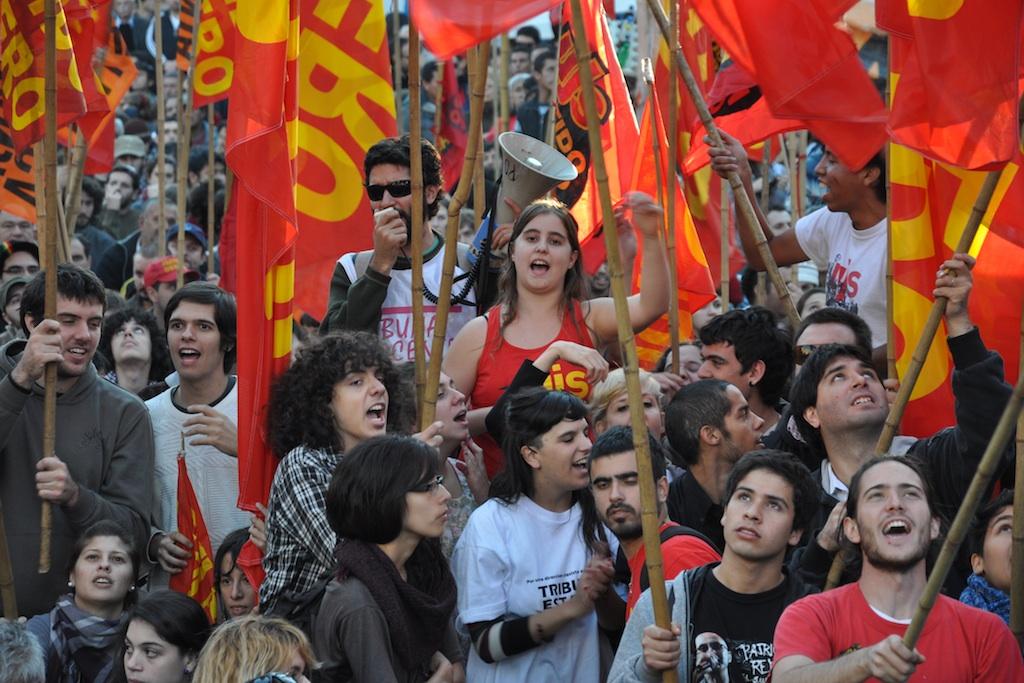Argentina’s president stays away from May Day celebrations
Crowds gathered and waved flags for Argentina’s annual May Day celebrations.
BUENOS AIRES – Hundreds gathered in the Plaza de Mayo in front of the presidential palace Tuesday to wave flags, drink mate and beat drums but not, as in years past, to hear the president speak.
This May 1, President Cristina Fernandez de Kirchner, whose policies in recent weeks have illustrated broad cracks within the pillars of Argentina’s political left, stayed away from the plaza, choosing instead to make an address on Twitter.
“Work is the great social organizer, which is why we defend it tooth and nail…I ask that you all take care of what has been achieved and redouble the effort,” Kirchner tweeted, echoing the sentiments of the much-revered populist president Juan Peron.
The red flags of left-wing parties opposed to Kirchner fluttered in the plaza, the stage Peron traditionally used to speak to the masses on May Day.
Amid a congressional debate over the law presented by Kirchner April 16 to seize 51 percent of YPF, the Argentine subsidiary of Spanish energy giant Repsol, the May Day festivities here revealed a shift away from union-centered politics.
The late General Peron remains an iconic figure in Argentina for nationalizing companies, financing huge social programs and, as labor minister, backing unions in industrial disputes, a move that propelled him to the presidency.
Kirchner and her late husband and predecessor Nestor Kirchner followed Peron’s lead, garnering union support to reach the highest office and using commodity windfalls to subsidize energy costs and fuel programs for the poor.
But friction over salary negotiations, the nationalization of pensions in 2008 and the ascendance of La Campora, a youth-led leftist group that doesn’t affiliate itself with unionism, has further alienated some of Argentina’s rank-and-file who complain union leaders have become too conciliatory.
Perhaps because of this rankling, the crowds that gathered to celebrate the day of the worker were smaller than in years past.
“They have made deals with the cupola,” said Jorge Altamira, the unsuccessful presidential candidate for the Worker’s Party in last year’s election, gesturing towards the presidential palace. “So they have no interest in having people in the streets.”
Kirchner’s proposal to expropriate YPF, which she described as “a recovery of sovereignty and control,” was met with widespread approval by Argentines who heralded the move in posters and graffiti as “taking back what’s ours.”
The move was condemned by Spain and the European Union, but largely celebrated among Latin American and Caribbean countries, who appeared to reward Kirchner by voting unanimously on Monday to put Argentina forward for a non-permanent seat on the United Nations’ Security Council in the upcoming year.
But some say the measure doesn’t go far enough. After government administrators of YPF held meetings with U.S. giant Chevron and France’s Total last week, a fresh set of posters appeared around the capital accusing the president of dissembling.
“Cristina lies—it’s not nationalization, it’s another handout,” one read.
During Senate hearings on the proposal in April, deputy economy minister Axel Kicillof, one of Kirchner’s closest advisors and a leader of La Campora, criticized the “neoliberal” policies of former president Carlos Menem, who privatized YPF and other state-run companies upon the advice of the World Bank and IMF.
“YPF’s new role has to be associated with economic development,” Kicillof said. In recent days Kiciloff has said forming new partnerships with foreign investors would be vital to turning around YPF’s production, which declined by 48 percent between 1998 and 2011.
“We support kicking Repsol out of the country and not paying them a cent, but the natural resources shouldn’t go to Chevron. They should be returned to the Argentine people,” said Javier Hermosilla, the union representative from a Kraft factory here.
While the crowds dispersed from the Plaza de Mayo, La Campora, founded by Maximo Kirchner in 2003 to support his father’s candidacy, kicked off its own May Day event in a modest hall decorated with prints of Evita, Peron’s immortalized wife, and posters depicting President Kirchner walking past a line of foreign flags, urging her, borrowing the title of a popular Argentine rock song, to “go forth, vigorous one.”
As the night wore on, people took turns lauding the Kirchners for the economy’s fast rate of growth since its 2001 collapse and listened to an elderly singer belt out nationalist folk songs. A member of La Campora, Ariel Quaglia, a 23-year-old law student, brushed off a comment that the turnout was modest.
“In Argentina, the first of May is more festive than combative because Peron was generous to workers as is Kirchnerism,” he said.
For more on workers' rights around the world, read GlobalPost's Special Report, "Worked Over: The Global Decline of Labor Rights."
